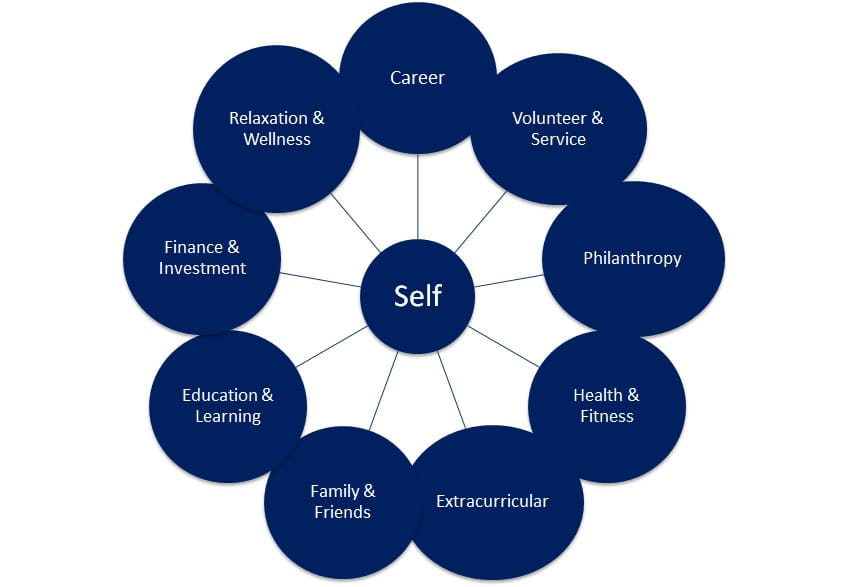
May 3, 2017 | InBrief
Rethinking work-life balance: 4-step guide to personal goal setting
Rethinking work-life balance: 4-step guide to personal goal setting
As an intern at Caterpillar, one of my first mentors said, “We spend more time planning our vacation then we do planning our life.” This concept has resonated with me throughout my career. When I was exploring career opportunities I sought out an employer offering short-term incentives, but also providing challenging career development opportunities while investing in my well-being and understanding my career is only one of several spokes in the “wheel of life.” This is one of the primary reasons I chose West Monroe – the people first culture is not lip service – the culture is fostered by a leadership team that embraces the concept of work-life integration.
We tend to be short-term focused, which is why planning a spring break or winter vacation is appealing. This approach is highly effective in providing immediate, short-term incentive, and should certainly be encouraged. But, if we are not careful, we can lose sight of the bigger picture for our life vision.
We are more than a quarter through the year, and by this time, more than half of new year’s resolutions are either broken or forgotten about. Unfortunately, “resolutions” tend to be baseless, misguided, and often short-sighted without fitting into our life’s “bigger picture.”
Here are four steps to creating meaningful personal goals, and it starts with a deeper understanding of yourself:
1. Know Thyself – Identify Your Core Values
Just as every company talks about core values, we as human beings have individual core values that shape our decisions and our goals. I think it’s extremely important to “know thyself” – to understand what makes you tick, so you can reference these values when making hard decision or developing goals. Your goals are not for anyone else, but yourself, so your goals and vision are derived from your values. A blog from The John Maxell Co. articulates the value of this exercise and provides recommendation on how best to facilitate personal value identification. Moreover, a company’s core values should align with your personal values. This promote congruence with the corporate culture and values-based decision making, which helps sustain happiness and engagement to the organization.
2. Life Wheel – Define your Roles
Once you define your values, define the “roles” you play in your life. These roles are typically that of a husband, mother, philanthropic board member, community leader, etc. Think of this as the spokes on a bicycle wheel. If everything is in balance, the wheel rolls along smoothly – however, if some of these areas are broken, well, then it’s a bumpy ride! Plus, if you are firing on all these areas while maintaining balance you will FEEL good about yourself while you continue to progress forward toward achieving your goals and fulfilling your vision. Think of a time when you were extremely challenged (but not overwhelmed) and were really contributing to several areas in your life wheel…it felt good! This has a psychological explanation and is referred to as the “Flow Zone.”
3. Developing Your Vision – Goal Setting through Life Roles
Once you define your roles, then it’s time to define what you want to achieve or realize through each of the roles you play. What do you plan to achieve in 2017? 2018? And beyond? It’s important to keep your goals realistic, specific, and achievable. Break down your goals into smaller, achievable while remaining challenged and holding yourself accountable.
4. Surrounding Yourself for Success – Personal Board of Advisors
Lastly, it’s important to surround yourself with people who will help make you a better person, help you achieve success, and align with your values. That’s where the personal board of advisors concept comes into play. These are select friends, family members, or mentors you trust, and have a personal stake in your happiness.
Aligning Your Goals and Values: Customize and Control Your Life Plan
The concept of “work-life balance” is understood conceptually, but in today’s fast-paced digital age, the concept of “work-life integration” is much more accurate. Even though our work is a large part of our life, it’s simply that. A part of our life wheel that must remain in balance to roll along smoothly toward our vision. At the core of almost every successful person is an accumulation of several small steps and actions that ultimately led to the realization and fulfillment of a vision. A vision that’s not anyone else’s, but your own. There are several measures for success, but altruistically, I believe the ultimate measure of one’s success is your own happiness. This will be (and should be) different for everyone. Everything that you do today will have an impact on your future – both positive and negative. You can’t expect something because of inaction – frankly, you might not like the outcome. Or more simply, without action, how do you expect anything to change?


